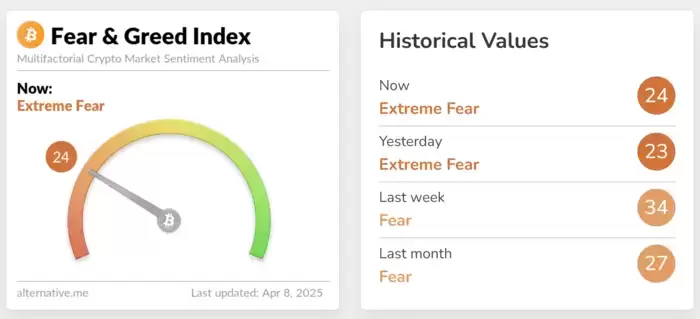 |
|
 |
|
 |
|
 |
|
 |
|
 |
|
 |
|
 |
|
 |
|
 |
|
 |
|
 |
|
 |
|
 |
|
 |
|
Cryptocurrency News Articles
Bitcoin (BTC) Seems to Occupy the Same Ideological Space Once Reserved for Gold
Dec 29, 2024 at 09:15 pm
Throughout history, whenever the United States perceived a threat to its dominance in the global economy, gold prices surged, and debates around the gold standard gained traction.

Throughout history, gold has symbolized stability during economic crises. In the late 1990s, figures like Peter Schiff championed gold as the ultimate monetary standard, much like today’s Bitcoin advocates.
But the U.S. has time and again refused to go back to the gold standard despite financial crises, instead choosing new ways of doing economics. Now, BTC seems to occupy that very ideological space once reserved for gold. Ki Young Ju, Founder & CEO of CryptoQuant, made this parallel and asked whether the U.S. would position Bitcoin as a strategic asset.
Throughout history, whenever the United States perceived a threat to its dominance in the global economy, gold prices surged, and debates around the gold standard gained traction.
In the late 1990s, Peter Schiff championed gold as the true form of money, much like today’s Bitcoin proponents. But the U.S. has consistently refused to go back to the gold standard despite financial crises, opting instead for new economic strategies.
Now, BTC appears to be occupying the same ideological space that was once reserved for gold. Ki Young Ju, Founder & CEO of CryptoQuant, has drawn this parallel and is wondering whether the U.S. will eventually position Bitcoin as a strategic asset.
If we look at the U.S. economic strategy throughout history, whenever it felt threatened in the global economy, gold prices went up, and there were always these discussions about the gold standard coming back.
While BTC adherents foresee a future whereby the US will adopt the virtual currency as a hedge against economic risk, for now, market sentiment places an exceptionally heavy premium on continued dollar dominance.
For the U.S. to seriously consider the adoption of BTC, there would need to be a real challenge to its global economic hegemony. For now, the dollar is still believed in, and global capital continues to pour into U.S. markets as a sign of confidence in its resilience.
Trump’s Ambiguous Bitcoin Stance
Former U.S. President Donald Trump has made a career out of touting American economic supremacy. On the campaign trail, the way he spoke about BTC marked him as a likely crypto ally.
But if there is one thing to be taken from the Trump record, it is that he approaches virtually everything with a calculating sense of political expedience.
If Trump goes ahead with boosting the dollar and giving more confidence in the U.S. economic sphere, it could play second fiddle to all of his BTC advocacy. Most politicians’ priorities seem to change after election; on separate occasions, Trump has already shown the ability to take a pragmatic view of top issues without pissing off his supporters.
Bitcoin’s Role In Future U.S. Policies
The role of Bitcoin in economic strategy is far from articulated. While Trump’s BTC Conference remarks were pro-BTC, they still seemed more a function of votes than policy. In the meantime, BTC can be seen as symbolic instead of practical, like a form of gold.
The dollar remains the safe haven of choice globally, with South Koreans still favoring it over gold or Bitcoin, especially with the won weakening—a sign of its enduring strength.
While Bitcoin may continue to attract ideological supporters, its role in the U.S. financial system depends on larger geopolitical and economic shifts. Until then, BTC remains more of a speculative asset than a strategic pillar of U.S. policy.
Disclaimer:info@kdj.com
The information provided is not trading advice. kdj.com does not assume any responsibility for any investments made based on the information provided in this article. Cryptocurrencies are highly volatile and it is highly recommended that you invest with caution after thorough research!
If you believe that the content used on this website infringes your copyright, please contact us immediately (info@kdj.com) and we will delete it promptly.
-

-

- Ozak AI: The Future of Trading Lies in Predictive AI
- Apr 08, 2025 at 06:50 pm
- The crypto market is evolving fast and those who capitalize on advanced technology will be the biggest winners. Enter Ozak AI a next generation platform that is integrating AI driven financial intelligence with blockchain to create a powerful ecosystem for traders and investors.
-

- The cryptocurrency market underwent a strong resurgence, led by altcoins like Jasmy, Pepe, and Render
- Apr 08, 2025 at 06:45 pm
- This positive trend was reflected in the crypto sector, where most tokens traded in the green. Some top performers included Core, Hyperliquid, Helium, Maker, and Ethena—each gaining more than 10%
-

-

-
![Bitcoin [BTC] Has Entered a Consolidation Phase, Showing Signs of Cooling Without Triggering Widespread Selling Bitcoin [BTC] Has Entered a Consolidation Phase, Showing Signs of Cooling Without Triggering Widespread Selling](/assets/pc/images/moren/280_160.png)
-

-

-

























































![Bitcoin [BTC] Has Entered a Consolidation Phase, Showing Signs of Cooling Without Triggering Widespread Selling Bitcoin [BTC] Has Entered a Consolidation Phase, Showing Signs of Cooling Without Triggering Widespread Selling](/uploads/2025/03/27/cryptocurrencies-news/articles/bitcoin-btc-entered-consolidation-phase-signs-cooling-triggering-widespread-selling/img-1_800_480.jpg)


